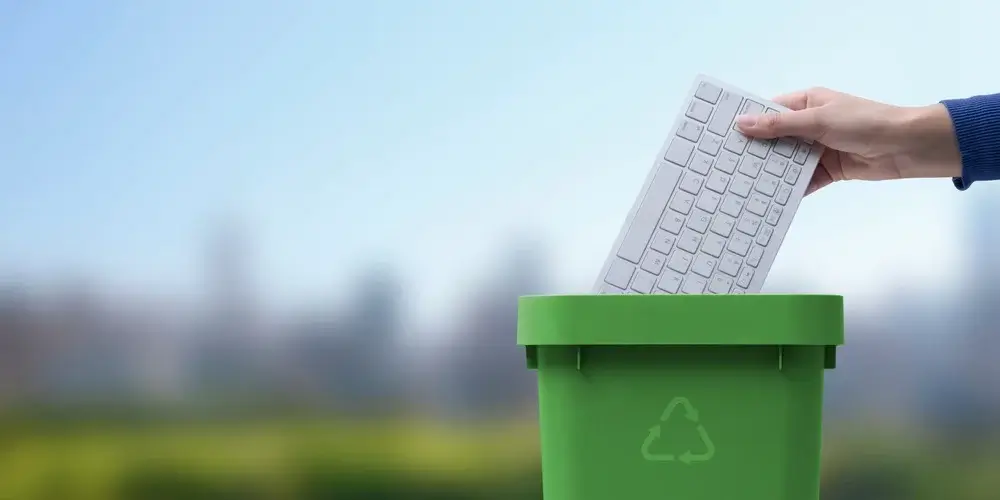What Constitutes E-Waste?
Eco-Friendly Computer Disposal Electronic waste, or e-waste, encompasses all discarded electronic devices, from smartphones and printers to outdated desktops and servers. These items often contain toxic components like lead, cadmium, and mercury, making proper electronic waste management essential for environmental safety.
The Growing Problem of Electronic Waste Globally
With rapid technological advancement, devices become obsolete quicker than ever. Globally, we generate over 50 million metric tonnes of e-waste annually. Alarmingly, only about 20% is formally recycled, while the rest ends up in landfills or informal dumps.
Environmental Consequences of Improper E-Waste Disposal
Improper disposal leads to the release of toxic chemicals into soil and water, harming ecosystems and human health. It also wastes valuable resources such as gold, copper, and rare earth metals that could otherwise be recovered through sustainable electronics disposal.
The Importance of Eco-Friendly Computer Disposal
Benefits of Responsible Computer Recycling
Eco-friendly computer disposal isn’t just about environmental protection it’s also a smart business decision. Companies that engage in green computing initiatives benefit from regulatory compliance, enhanced brand reputation, and reduced storage costs for obsolete hardware.
Legal and Ethical Considerations in E-Waste Management
Governments worldwide are tightening computer disposal regulations. Non-compliance can lead to hefty fines and reputational damage. Ethically, it’s imperative to ensure sustainable IT asset disposal that minimises environmental harm and protects sensitive data.
How Eco-Friendly Computer Disposal Services Operate
Collection and Transportation of Obsolete Electronics
These services begin by collecting IT equipment directly from businesses or consumers. Some providers offer secure bins or scheduled pickups, ensuring safe handling and transportation aligned with responsible electronics recycling protocols.
Data Destruction and Security Measures
Before recycling, sensitive data must be destroyed using methods like degaussing, shredding, or overwriting. Top providers prioritize secure data destruction to prevent breaches, ensuring compliance with privacy laws like GDPR and HIPAA.
Recycling Processes and Material Recovery
E-waste is dismantled and sorted into plastics, metals, and circuit boards. Through e-waste recycling services, up to 95% of materials can be recovered and reused, reducing the need for virgin resource extraction.
Certification and Compliance Standards
Reputable providers are certified e-waste recyclers with R2, e-Stewards, or ISO certifications. These standards ensure adherence to environmental laws, safe labor practices, and proper hazardous waste handling.
Choosing the Right Computer Disposal Service
Key Features to Look for in a Recycling Provider
When selecting a provider, ensure they offer:
- Certified recycling processes
- Transparent reporting
- Onsite or offsite IT equipment recycling
- Environmentally responsible logistics
Questions to Ask Potential Service Providers
- Are you certified in eco-friendly recycling standards?
- Do you provide data destruction certificates?
- How do you handle downstream waste partners?
Case Studies: Successful E-Waste Recycling Initiatives
Programs like Give IT Forward showcase how refurbished electronics can support underprivileged communities while reducing waste. Corporate partnerships with nonprofit recyclers have diverted thousands of tonnes of e-waste from landfills.
Alternatives to Disposal: Extending the Life of Your Electronics
Donating Functional Computers to Charities and Non-Profits
Many schools, libraries, and NGOs accept working computers. Donate old computers to make a difference. These donations can help bridge the digital divide and reduce waste.
Refurbishment and Resale: Giving Electronics a Second Life
Refurbishing outdated computers for resale is another sustainable solution. It supports the growing refurbished electronics resale market, offering affordable tech while reducing the environmental footprint.
Manufacturer Take-Back Programs and Trade-In Options
Brands like Dell, Apple, and HP offer manufacturer take-back programmes, where consumers can return used devices for recycling or credit toward new purchases – an easy path to sustainable IT asset disposal.
The Future of E-Waste Management
Innovations in Recycling Technologies
Emerging tech like AI-powered sorting systems and chemical recovery processes are revolutionising e-waste recycling services, making them more efficient and scalable.
Policy Developments and Global Initiatives
Initiatives like the EU’s Circular Economy Action Plan and the Basel Convention are shaping global standards for responsible electronics recycling, urging nations to adopt uniform protocols.
The Role of Consumers in Promoting Sustainable Practices
Consumers play a vital role by choosing eco-conscious electronics, engaging in green computing initiatives, and educating others about computer recycling programmes.
Conclusion: Taking Action to Reduce E-Waste
The journey toward a sustainable digital future begins with informed choices. Whether you’re a business seeking secure data destruction or a consumer exploring options to donate old computers, every step counts.
Partnering with eco-friendly computer disposal services ensures your e-waste is handled responsibly, benefiting both the planet and future generations. Let’s act now to reduce the e-waste environmental impact and drive a cleaner, greener tomorrow.
Frequently Asked Questions (FAQs)
1. What is the most eco-friendly way to dispose of a computer?
The most eco-friendly method is using a certified e-waste recycler that offers secure data destruction and environmentally responsible recycling.
2. Can I donate my old computer instead of recycling it?
Absolutely! If your computer is functional, donating it to a non-profit or school can give it a second life and help those in need.
3. How do I know if a recycling company is certified?
Look for certifications like R2, e-Stewards, or ISO. These indicate the provider follows global standards for responsible recycling.
4. What happens to my data when I recycle my computer?
Professional services Ensure secure data destruction using industry-standard methods before any recycling begins.
5. Are there regulations I need to follow when disposing of business computers?
Yes. Businesses must comply with computer disposal regulations related to data security and environmental safety.
6. What is “Give IT Forward”, and how does it help?
“Give IT Forward” is a charitable initiative that refurbishes donated IT equipment and redistributes it to communities in need, reducing waste and supporting digital inclusion.
